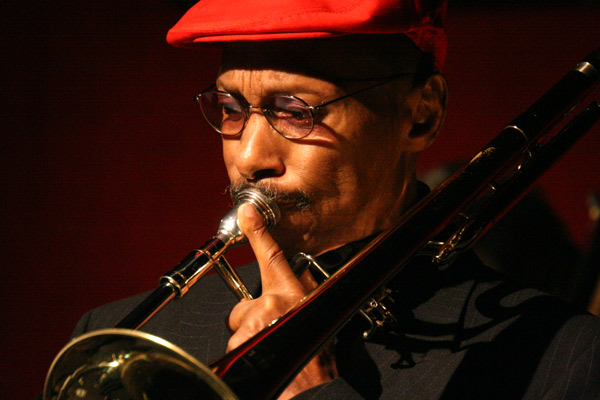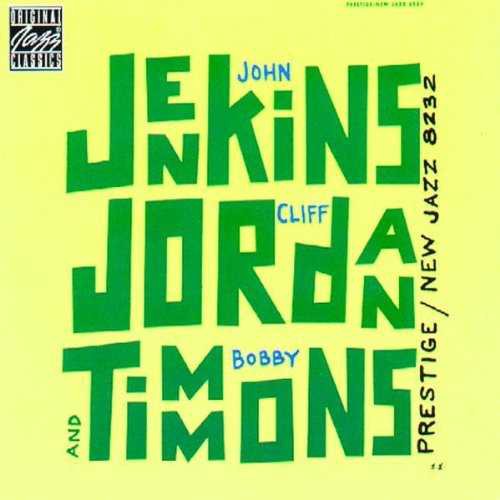Soft Talk – Julian Priester
This uptempo bebop-style head on the chord progression of the standard Whispering offers a tasty alternative to Dizzy Gillespie's classic on the same changes, Groovin' High.
- Recording: John Jenkins - Jenkins, Jordan And Timmons
- Recorded on: July 26, 1957
- Label: New Jazz (NJ 8232)
- Concert Key: E-flat
- Vocal Range: , to
- Style: Swing (uptempo)
- Alto Sax - John Jenkins
- Tenor Sax - Clifford Jordan
- Piano - Bobby Timmons
- Bass - Wilbur Ware
- Drums - Dannie Richmond
Video
- Description
- Historical Notes
- Solos
- Piano Corner
- Bass Corner
- Drum Corner
- Guitar Corner
- Inside & Beyond
- Minus You
Though the title may suggest a slow or laid-back song, Soft Talk is a hard-driving uptempo swinger. The name is actually a reference to its source material: the changes of the standard Whispering. Like Groovin' High, Dizzy Gillespie's classic on the same chord progression, Soft Talk is written in a classic bebop style. The stop-and-start rhythms are a bit more irregular than Groovin' High; Dizzy's melody is referenced at the beginning of the B and D sections, but with the main two-note phrase reappearing in a rising sequence on beat 4 and then 2 of the next measure.
Our lead sheets reflect this recording. Alto saxophonist John Jenkins plays part of the B and D sections an octave lower, in unison with the tenor sax, but the melody is certainly playable in the upper octave throughout as shown on our E♭ lead sheet.
Our lead sheets reflect this recording. Alto saxophonist John Jenkins plays part of the B and D sections an octave lower, in unison with the tenor sax, but the melody is certainly playable in the upper octave throughout as shown on our E♭ lead sheet.
"Jenkins, Jordan & Timmons" was recorded at Rudy Van Gelder's legendary Hackensack Studio.
Julian Priester played on the first recording of Soft Talk, by Sun Ra's septet in February 1956. This version is in the key of F; the melody is slightly different from the Jenkins/Jordan/Timmons recording. A classic example of straight-ahead, small-group early Sun Ra, this recording has a big-band-esque 4-horn arrangement featuring tenor saxophonist John Gilmore on the melody and first solo.
Alto saxophonist John Jenkins' all too brief career was mostly documented in an all-star series of recordings in 1957, of which "Jenkins, Jordan & Timmons" was the seventh. In the previous month Jenkins played on Clifford Jordan's self-titled debut album. Jenkins stopped playing in the '60s, but started again in the '80s; the only recording from the latter part of his career was also with Jordan, on the latter's 1990 big band album "Play What You Feel."
"Jenkins, Jordan & Timmons" is also the second of three albums featuring Jenkins alongside drummer Dannie Richmond, one of only a few recordings Richmond made outside of his work with Charles Mingus. Richmond and Clifford Jordan played together in Mingus' sextet for his 1964 European tour; though there are many well-known live recordings from the tour, Jordan never made a studio recording with Mingus.
Julian Priester played on the first recording of Soft Talk, by Sun Ra's septet in February 1956. This version is in the key of F; the melody is slightly different from the Jenkins/Jordan/Timmons recording. A classic example of straight-ahead, small-group early Sun Ra, this recording has a big-band-esque 4-horn arrangement featuring tenor saxophonist John Gilmore on the melody and first solo.
Alto saxophonist John Jenkins' all too brief career was mostly documented in an all-star series of recordings in 1957, of which "Jenkins, Jordan & Timmons" was the seventh. In the previous month Jenkins played on Clifford Jordan's self-titled debut album. Jenkins stopped playing in the '60s, but started again in the '80s; the only recording from the latter part of his career was also with Jordan, on the latter's 1990 big band album "Play What You Feel."
"Jenkins, Jordan & Timmons" is also the second of three albums featuring Jenkins alongside drummer Dannie Richmond, one of only a few recordings Richmond made outside of his work with Charles Mingus. Richmond and Clifford Jordan played together in Mingus' sextet for his 1964 European tour; though there are many well-known live recordings from the tour, Jordan never made a studio recording with Mingus.
Related Songs
Email Send Soft Talk to a friend
Send this page to a friend via email. Add your name or email in the first field. In the second, add one or more email addresses, separated by a comma.

Julian Priester
born on June 29, 1935
Julian Priester has brought a vital, spirited style of trombone playing to a wealth of artists, while contributing interesting compositions to the libraries of many of these groups. In his native Chicago, he played with bluesmen Muddy Waters and Bo Diddley, forward-looking bandleader Sun Ra, the master swing era vibist Lionel Hampton and blues-jazz singing marvel Dinah Washington. Read more...
There was a problem.
...

